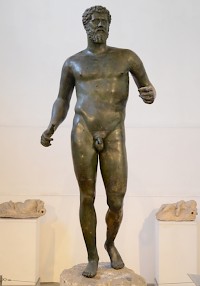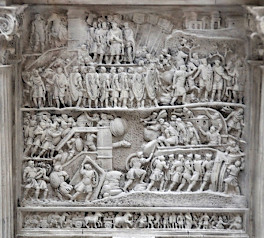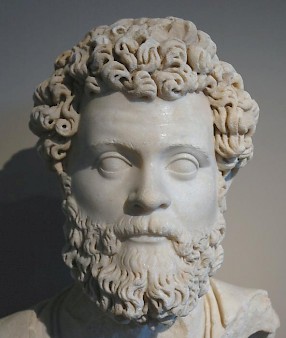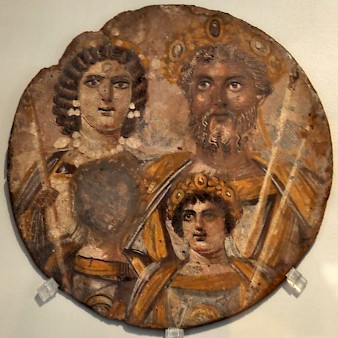Lucius Septimius Severus - Livius (original) (raw)
This page is a stub. It will be expanded to a full-fledged article.
Lucius Septimius Severus: emperor of the Roman world (r.193-211).
Septimius Severus
Names:
- 11 April145: Lucius Septimius Severus
- 9 April 193: Imperator Caesar Lucius Septimius Severus Pertinax Augustus
- 4 February 211: natural death
Successor of: Pertinax, Didius Julianus
Relatives:
- father: Publius Septimus Geta
- mother: Fulvia
- first wife: Paccia Marciana
- second wife: Julia Domna
Early career

Septimius Severus
145 Born in Lepcis Magna- 170 Quaestor
- 171 Quaestor II
- 173 Deputy of the proconsul of Africa
- 174 Tribune
- 178 Praetor
- c.180 Iuridicus Asturiae et Callaeciae
- c.182 Commander of IIII Scythica
- 186-189 Propraetor of Gallia Lugdunensis
- 189/190 Proconsul of Sicily
- 190 Consul
- 191-193 Propraetor of Pannonia Superior
Main deeds
- 193 Murder of Pertinax; Didius Julianus, Pescennius Niger (recognized by the Parthian king Vologases V), Clodius Albinus, and Septimius Severus proclaimed emperor (Imperator I); Severus marches on Rome; recognized by the Senate; marches to the east
- 194 Consul II (with Clodius Albinus II); siege of Byzantium; victory at Cyzicus (Imperator II); victory at Nicaea (Imperator III); defeats Niger near Issus (Imperator IV); Niger flees to Parthia but is killed
- Baalbek raised to the rank of colonia; claims to have been adopted by Marcus Aurelius
- 195 First war against the Parthian Empire (about Osrhoene [_Imperator V_], Arabia Scenite [_Imperator VI_], and Adiabene [_Imperator VII_]); accepts the titles Arabicus, Adiabenicus, and Pius; war declared upon Clodius Albinus
- 196 Caracalla made caesar; Severus returns to Rome
- 196/197 Fall of Byzantium (Imperator VIII)
- 197 Clodius Albinus defeated near Lugdunum (Imperator IX); beginning of Second Parthian War

The fall of Ctesiphon, as shown on the Arch of Septimius Severus
197/198 Capture of Ctesiphon (Imperator X)- 198/199 Parthian victory; accepts the title Parthicus (Imperator XI); diplomatic "victory" at Hatra (Imperator XII)
- 199 Stay in Syria and Egypt
- 200 Stay in Rome
- 201 Preparation of visit to Africa; founding of Gholaia
- 202 Consul III (with Caracalla); decennalia in Rome; Caracalla marries Plautilla; moves to Africa
- 203 Campaign against the Garamantes; visit to Lepcis; dedication of the Arch of Septimius Severus; Byzantium refounded
- 204 Ludi Saeculares
- 205 Caracalla consul II (with Geta); fall of Plautian, the praetorian prefect
- 206 War against the bandits of Bulla Felix
- 208 Caracalla consul III (with Geta II); Leaves for Britain
- 210 Accepts the title Britannicus
- 211 Death in York
Julia Domna, Septimius Severus, Geta (erased), and Caracalla
New legions: I Parthica, II Parthica, III Parthica
Buildings (Rome)
Arch of Septimius Severus, Arch of the Bankers, Baths of Severus, Septizodium
Buildings (outside Rome)
- Byzantium, Mese, Sea Walls, Hippodrome
- Lepcis Magna, many buildings, like the Arch of Severus, the New Forum, the Basilica, the Temple of the Septimians, and the Port
Contemporary events
- 197 Tertullian publishes his Apologeticum
- 203 Martyrdom of Perpetua
Links
- biography included in the Historia Augusta,
- Cassius Dio, Roman History (Book 75, 76, 77)
- Herodian, History of the Roman Empire (Book 2 and 3)
- Asellius Aemilianus
- Julia Maesa
- Philostratus
- Plautianus
- Tertullian
- Varius Marcellus
"No battles and no victories can be compared to those of Severus, and no army to the size of his army; there are no comparable uprisings among nations, or total number of campaigns, or length and speed of marches."note[Herodian, History of the Roman Empire 3.7.7.]

